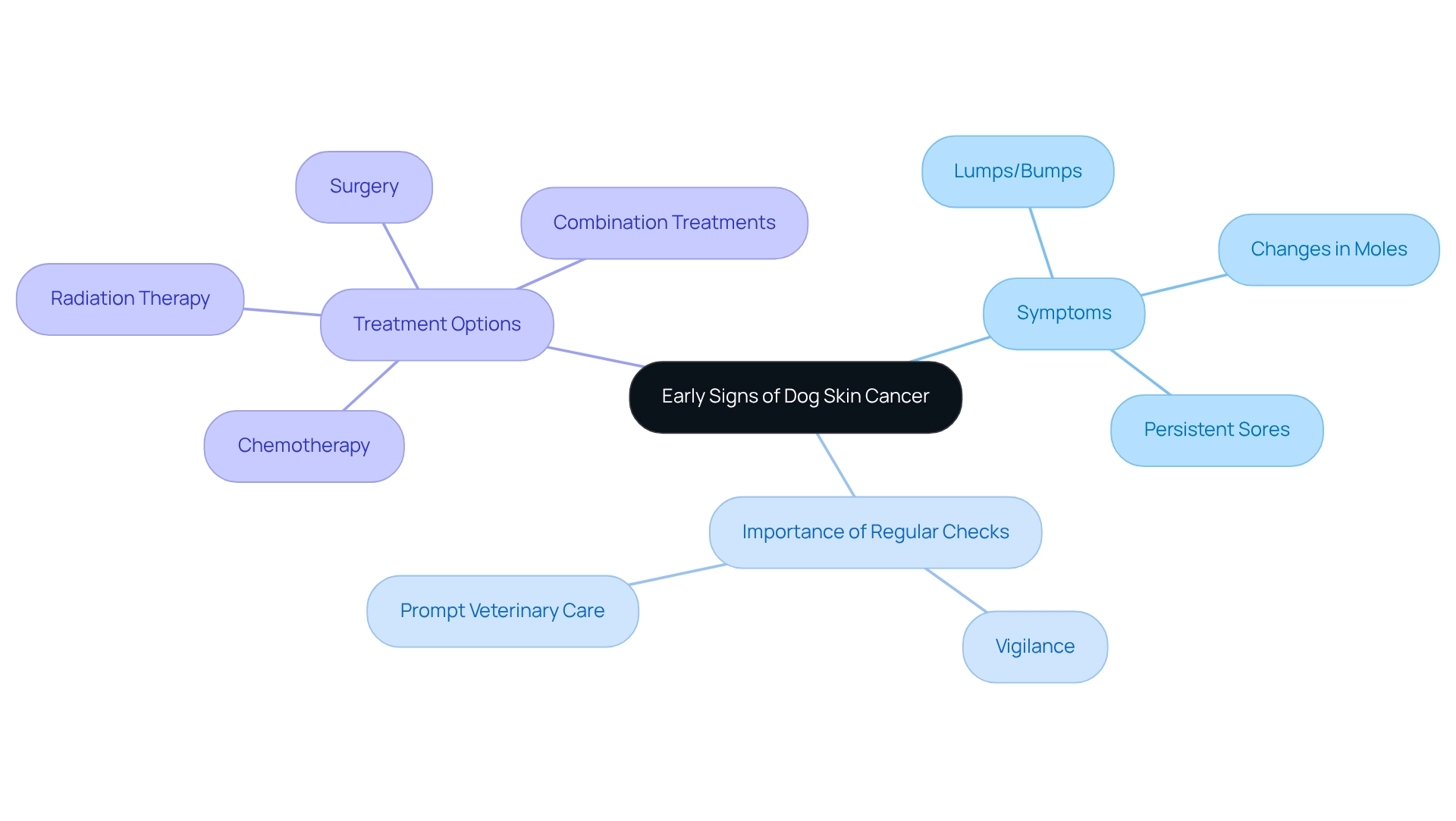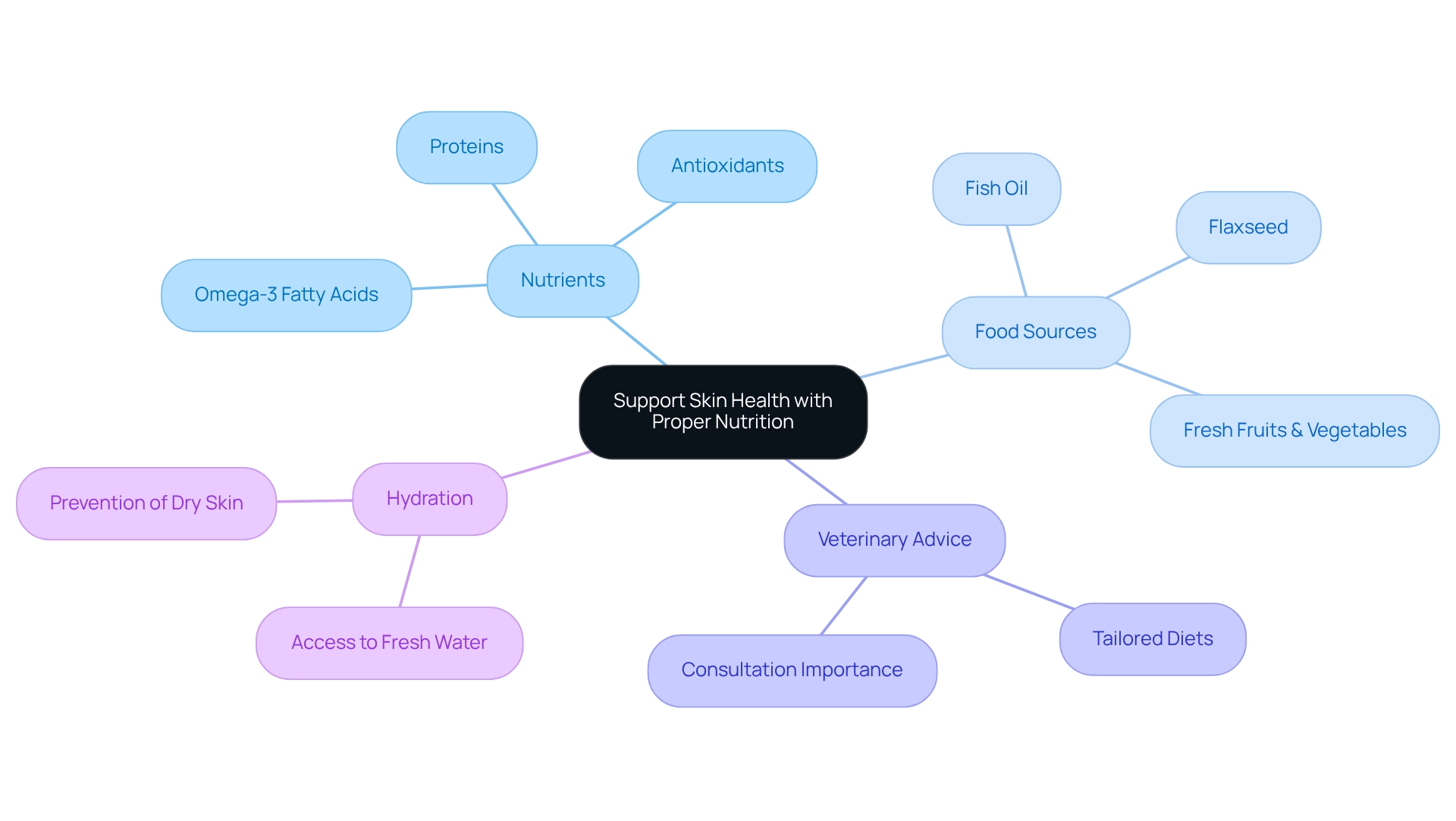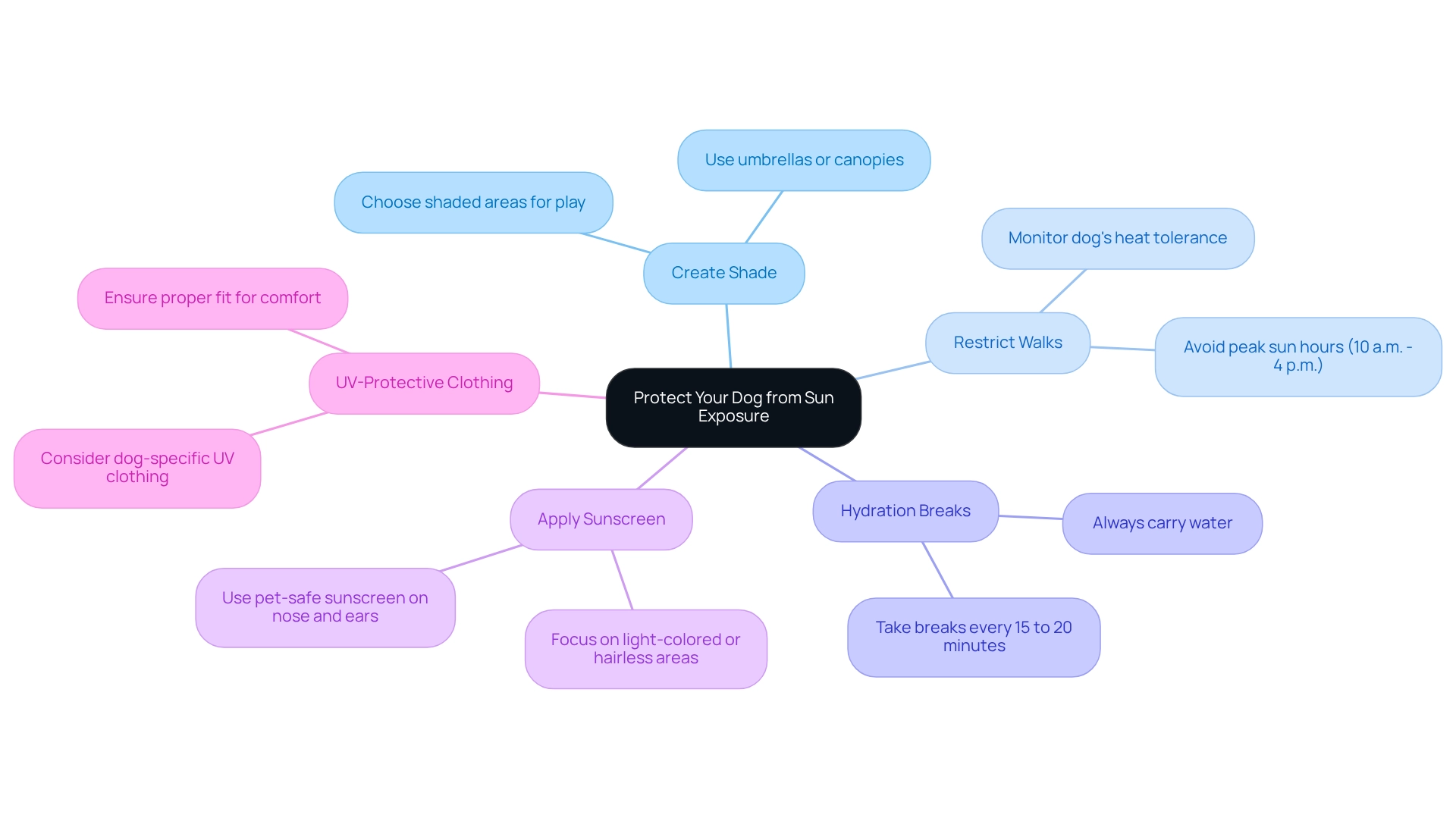10 Essential Tips for Preventing Dog Skin Cancer
Overview
This article offers essential tips for preventing skin cancer in your furry family members. It emphasizes the importance of regular check-ups, monitoring skin changes, and understanding risk factors such as sun exposure and breed predispositions. By promoting proactive measures like routine skin examinations and educating pet owners about early signs and preventive strategies, it highlights the critical role you play in safeguarding your dogs’ dermatological health.
As loving guardians, it’s natural to be concerned about the well-being of your pets. Knowing how to recognize potential issues can make all the difference. At Adventure Den, we believe in empowering you with the knowledge to protect your beloved companions.
Consider incorporating regular skin checks into your routine. These simple examinations can help catch any changes early, giving your pet the best chance for a healthy life. Remember, understanding the risks associated with sun exposure and breed predispositions is crucial in this journey.
Let’s work together to create a nurturing environment for your pets. By staying informed and proactive, you can ensure their health and happiness. After all, your commitment to their care is what truly makes a difference. Take action today—your dogs deserve it!
Introduction
In a world where dogs are cherished family members, the significance of their health, especially skin health, cannot be overstated. Alarmingly, many dogs are affected by skin cancer, prompting pet owners to be proactive in understanding the risks and recognizing early signs of this serious condition.
Adventure Den, a premier dog daycare, not only provides exceptional care but also prioritizes educating pet owners about skin health and early detection strategies. This article explores the critical aspects of dog skin cancer—common types, risk factors, treatment options, and preventative measures—empowering you to take charge of your furry family members’ well-being.
By fostering awareness and encouraging regular check-ups, you can enhance your dogs’ quality of life, ensuring they remain healthy and happy for years to come.
Adventure Den: Premier Dog Daycare with Expertise in Skin Health
Adventure Den is more than just a daycare; it is a nurturing sanctuary that prioritizes the health and well-being of your furry family members. With a dedicated team of informed pet care experts, the facility emphasizes dermal health, particularly concerning dog skin cancer, equipping pet owners with the knowledge to recognize potential problems early. This proactive approach is crucial in preventing serious issues like melanoma, as recent data shows that dog skin cancer affects a significant number of canines, making early identification essential.
By creating a safe environment for dogs to play and socialize, Adventure Den ensures that each visit contributes positively to their overall health. The facility also offers educational programs, teaching pet guardians about the importance of routine checks and the early detection of lesions, including signs of dog skin cancer, which can greatly improve outcomes.
As co-owner Kirsty MacGregor notes, the challenges posed by city regulations have made it increasingly important for Adventure Den to focus on health and education. Through these initiatives, Adventure Den not only enhances the quality of care for its furry guests but also empowers guardians to take an active role in their pets’ health. This commitment establishes Adventure Den as a leader in dog daycare services centered on dermatological wellness, ensuring that your beloved pets receive the compassionate care they deserve.
Recognize Early Signs of Dog Skin Cancer
Initial signs of dog skin cancer can manifest as unusual lumps or bumps, changes in existing moles, or persistent sores that refuse to heal. As a caring pet owner, it’s essential to routinely examine your furry family member’s coat, especially in areas with less fur, like the belly and ears. Unfortunately, statistics reveal that many dog guardians do not regularly check for skin issues, underscoring the importance of vigilance. By noticing these changes early, you can seek prompt veterinary care, which significantly enhances treatment outcomes.
When it comes to addressing tumors in dogs, treatment options may include chemotherapy, surgery, radiation therapy, or a combination tailored to your pet’s specific needs. At Adventure Den, we understand the importance of quality care, which is why we offer a special introductory rate for first-time visitors, making it easier for you to experience our exceptional services. By being proactive and observant, you can play a vital role in the early detection of dog skin cancer, ensuring your beloved companion receives the attention they need as swiftly as possible. Remember, your commitment to your pet’s health is invaluable, and together, we can create a nurturing environment for your furry family members.

Understand Common Types of Dog Skin Cancers
As a caring pet owner, you may have concerns about the health of your furry family members, particularly regarding skin issues. Frequent varieties of dermal tumors in canines include:
- Mast cell neoplasms
- Squamous cell carcinoma
- Malignant melanoma
Among these, mast cell tumors are the most common, often appearing as solid masses beneath the surface. It’s important to note that mast cell tumors represent a considerable share of dermal malignancies in canines, highlighting the necessity of routine examinations and attentiveness to any changes in your pet’s coat.
Squamous cell carcinoma typically manifests as raised, ulcerated lesions that may bleed or become crusty, frequently found on areas with less fur or those exposed to sunlight. On the other hand, malignant melanoma can present as dark, pigmented growths, often located in the mouth or on the surface of the body. As Ashley, a veterinary oncologist, compassionately states, “As a veterinary oncologist, I am dedicated to offering the utmost quality of care and knowledge in the diagnosis and treatment of skin cancer in canines.”
Understanding dog skin cancer and other types of tumors is crucial for dog guardians, as early identification can significantly influence treatment outcomes. Currently, there are no prevention strategies to stop dogs from developing mast cell tumors, making it even more essential for caretakers to recognize these signs and seek veterinary advice promptly. By doing so, you ensure that your beloved companions receive the best possible care, allowing them to thrive in a nurturing environment.

Identify Risk Factors for Dog Skin Cancer
Understanding the risk factors for dog skin cancer is crucial for every pet guardian. It’s natural to worry about our furry family members, especially when several factors can significantly increase a dog’s likelihood of developing this serious condition. Excessive sun exposure is a primary concern, particularly for breeds like Boxers and Bulldogs, as they are genetically prone to dog skin cancer.
Dogs with light-colored fur or thin coats are especially susceptible to harmful UV rays, increasing their risk of dog skin cancer, making it essential for caregivers to carefully monitor their pets’ sun exposure. Moreover, a history of skin injury can elevate the risk of dog skin cancer, underscoring the importance of regular veterinary check-ups.
Data indicates that specific breeds face greater risk due to hereditary factors, highlighting the need for breed-specific knowledge among dog caretakers. To protect your beloved companions, consider implementing preventative measures such as:
- Providing shaded areas during outdoor play
- Applying pet-safe sunscreen
While regular sunlight exposure supports a dog’s internal clock and sleep cycle, promoting overall health and well-being, it’s vital to balance this with safety. By understanding these factors and taking proactive steps—like watching for changes in your dog’s fur and discussing sun exposure management with your veterinarian—you can significantly enhance your furry friend’s health and happiness.

Schedule Regular Veterinary Check-Ups for Early Detection
Arranging routine veterinary examinations is essential for the early identification of dog skin cancer in your furry family members. During these visits, veterinarians conduct thorough examinations of the coat and recommend appropriate screenings based on your dog’s age and risk factors. A research project involving 359 canines with confirmed tumor diagnoses underscores the significance of timely veterinary appointments, showing that early identification through routine examinations can lead to more effective treatment options and improved outcomes for pets diagnosed with dermatological tumors.
Veterinary experts recommend that canines have check-ups at least annually, with more frequent visits for older pets or those with a history of dermatological concerns. This proactive approach not only aids in the early detection of dermatological issues but also fosters a culture of preventive care. Moreover, successful case studies reveal that many dogs have thrived thanks to early detection through regular veterinary visits, resulting in effective treatment plans and enhanced quality of life.
Expert opinions highlight the importance of early detection; as Dr. Smith noted, ‘Regular check-ups can make all the difference in catching dog skin cancer early, which is key to successful treatment.’ Additionally, financial barriers, as highlighted in the case study on pet insurance, can impact pet guardians’ ability to pursue regular veterinary care, ultimately affecting early detection rates. By prioritizing these visits, pet owners can ensure their beloved companions receive the best possible care, significantly enhancing their health and longevity.

Explore Treatment Options for Dog Skin Cancer
When it comes to treatment choices for your furry family members facing dog skin cancer, it’s essential to know that options are varied and tailored to the specific type and stage of the condition. The most common approach is the surgical removal of tumors, which has shown success rates that can vary based on tumor characteristics and your dog’s overall health. For example, early-stage mast cell tumors, particularly prevalent in breeds like Boxers and Bulldogs, can often be effectively treated through surgery, leading to favorable outcomes when diagnosed promptly.
In addition to surgery, chemotherapy and radiation therapy are standard treatments that may be recommended, especially for more advanced cases. Recent advancements in veterinary oncology have introduced immunotherapy as a promising option, utilizing your dog’s immune system to combat malignant cells. This innovative approach is gaining traction, with studies indicating that canines receiving immunotherapy may experience improved quality of life and extended survival rates.
Veterinary oncologists emphasize the importance of a tailored treatment plan, often combining surgical and non-surgical methods to optimize results. For instance, a case study showcased an effective treatment strategy for a dog identified with cancer on its surface, which involved tumor removal followed by chemotherapy, leading to a substantial decrease in tumor recurrence.
Current statistics indicate that while no conclusive prevention methods are available for mast cell tumors, canines lacking vitamin D3 may be at increased risk for developing these tumors. Additionally, early detection and intervention are crucial. Certain breeds, including Boxers, Boston Terriers, Bulldogs, Pitbull Terriers, Weimaraners, and Rhodesian Ridgebacks, are more susceptible to mast cell tumors. Pet owners are encouraged to monitor their dogs for any unusual growths or changes in the skin, as timely veterinary consultation for dog skin cancer can lead to more effective treatment outcomes.
Participating in open conversations with veterinarians about the latest treatment alternatives and advancements in canine health care is crucial for making informed choices regarding your pet’s well-being. Dr. Gang Zheng and a group of biomedical researchers have identified a ‘smart,’ organic, biodegradable nanoparticle that utilizes heat and light in a controlled way to target tumor cells, highlighting the innovative advancements occurring in this field. Remember, your pet’s health is a priority, and staying informed empowers you to provide the best care possible.
Support Skin Health with Proper Nutrition
A balanced diet rich in omega-3 fatty acids, antioxidants, and high-quality proteins is vital for maintaining the health of your furry family members’ skin, potentially helping to prevent skin cancer. Incorporating foods like fish oil, flaxseed, and an array of fresh fruits and vegetables can significantly reduce inflammation and promote a lustrous coat. Research shows that omega-3 fatty acids may lower the risk of dermatological issues, with studies suggesting they could reduce the occurrence of tumors by as much as 30%.
Veterinary experts, such as Dr. Sara Ochoa, stress the importance of tailored diets to meet your pet’s specific nutritional needs. Following specially designed growth diets is crucial for effectively addressing skin problems. Additionally, a case study on hydration highlights that providing fresh, clean water is essential for preventing dry, flaky skin, which can lead to complications, including an increased risk of dermal tumors.
Before making any dietary changes, consulting with a veterinary health team is essential to prevent nutrient imbalances or toxicity. By ensuring that your beloved companions receive the right nutrients, you can significantly enhance their skin health and overall well-being, ultimately supporting cancer prevention. Remember, a nurturing environment and proper care can make all the difference for your pets.

Protect Your Dog from Sun Exposure
To protect your furry family members from harmful sun exposure, it’s essential to create a shaded environment during outdoor activities. Consider restricting walks during peak sun hours, specifically between 10 a.m. and 4 p.m. Each dog’s heat tolerance varies, so understanding your pet’s limits is vital. Research shows that taking water breaks every 15 to 20 minutes can help maintain hydration and comfort during these outings.
Applying pet-safe sunscreen to vulnerable areas, such as the nose and ears, is crucial in preventing painful sunburns. A case study titled ‘Using Canine Sunscreen’ highlights the importance of safeguarding canines, particularly those with light-colored fur or minimal hair coverage. It recommends using pet-safe sunscreen to ensure their comfort and safety.
For added protection, consider UV-protective clothing, which can offer an additional layer of defense against the sun’s rays. These strategies not only enhance the outdoor experience for dogs but also significantly reduce the risk of skin damage and potential long-term health issues, including the risk of dog skin cancer. Veterinary experts emphasize the importance of being proactive in sun safety, especially as warmer weather attracts more insects and increases the likelihood of outdoor activities. Remember to tidy up after your pets at the beach; this upholds cleanliness and encourages responsible pet stewardship. By implementing these protective measures, you can ensure your furry companions enjoy sunny days safely and happily.

Monitor Skin Changes in Your Dog Regularly
Regularly checking your dog’s coat is vital for spotting potential health issues early, including serious conditions like cancer. As a caring pet guardian, it’s important to make it a routine to look for changes such as new lumps, bumps, or discoloration. You can easily integrate a thorough examination into your grooming sessions or during your casual moments of petting.
Dr. Sue Ettinger, DVM, DACVIM (Oncology), emphasizes, ‘Whether addressing a new growth or a recurrent one, a proactive approach to tumors can save lives.’ Sadly, many dog owners overlook regular examinations, which can lead to missed opportunities for early intervention.
By staying informed about common dermatological conditions, you can help ensure your furry family members live comfortably and free from irritation. Incorporating coat inspections into your pet care routine not only promotes their health but also strengthens the bond you share, ensuring your dog remains happy and healthy.
Stay Informed About Dog Skin Cancer Risks and Prevention
As guardians of your furry family members, it’s essential to stay informed about the dangers associated with dog skin cancer and the latest prevention techniques. With nearly 50% of all dogs over the age of 10 affected by illness, understanding breed-specific vulnerabilities is vital. Breeds such as Boxers and Bulldogs are particularly prone to dermatological issues, making awareness even more crucial for their dedicated caretakers. By recognizing environmental hazards like excessive sun exposure and harmful chemicals, you can significantly reduce risks for your beloved pets.
Engaging with trustworthy sources, including veterinary experts and community initiatives, empowers you to make informed choices. Many communities offer educational programs that enhance understanding of cancer risks and prevention methods, helping pet owners identify early signs of lesions or abnormal growths. For instance, local veterinary clinics may organize workshops or informational sessions focused on dermal health. Additionally, the latest research highlights innovative prevention strategies, including vaccines currently in development, aimed at improving canine health outcomes.
Veterinarians emphasize the importance of regular check-ups and coat examinations, as early detection is crucial for effective treatment. As Mark Mamula, a Professor of Medicine at Yale School of Medicine, notes, “I receive numerous emails from appreciative dog guardians who had been informed that their pets had weeks or months to live but who are now two or three years beyond their illness diagnosis.” By remaining informed and proactive, you can ensure your dogs lead happy, healthy lives while minimizing the risk of skin cancer.
Conclusion
Understanding the critical nature of dog skin health is essential for every pet owner. This article highlights the alarming prevalence of skin cancer in dogs and emphasizes the importance of early detection through regular monitoring and veterinary check-ups. By recognizing early signs of skin cancer, such as unusual lumps or persistent sores, pet owners can ensure timely intervention, significantly improving treatment outcomes.
Additionally, the article outlines the common types of skin cancers affecting dogs, risk factors associated with these conditions, and the various treatment options available. The proactive measures discussed—ranging from proper nutrition and sun protection to regular skin examinations—empower owners to take charge of their pets’ health. By fostering a culture of vigilance and education, pet owners can play a crucial role in preventing and managing skin cancer in their dogs.
Ultimately, prioritizing skin health not only enhances the quality of life for dogs but also strengthens the bond between pets and their owners. By staying informed and proactive, pet owners can contribute to their furry companions’ long-term health and happiness, ensuring they remain cherished family members for years to come.
Frequently Asked Questions
What is Adventure Den?
Adventure Den is a daycare facility that prioritizes the health and well-being of pets, particularly focusing on dog skin health and education regarding skin cancer.
Why is early detection of dog skin cancer important?
Early detection of dog skin cancer is crucial because it allows for prompt veterinary care, which significantly enhances treatment outcomes and can prevent serious issues like melanoma.
What signs should pet owners look for to identify potential skin cancer in dogs?
Pet owners should look for unusual lumps or bumps, changes in existing moles, and persistent sores that do not heal, particularly in areas with less fur, such as the belly and ears.
What types of tumors are common in dogs?
Common types of dermal tumors in dogs include mast cell neoplasms, squamous cell carcinoma, and malignant melanoma. Mast cell tumors are the most prevalent.
What treatment options are available for dog tumors?
Treatment options for dog tumors may include chemotherapy, surgery, radiation therapy, or a combination of these, tailored to the specific needs of the pet.
How does Adventure Den support pet guardians in their pets’ health?
Adventure Den offers educational programs to teach pet guardians about routine checks, early detection of lesions, and the importance of monitoring for signs of skin cancer.
What is the significance of routine examinations for dogs?
Routine examinations are significant because they help pet guardians notice changes in their dog’s skin that could indicate health issues, ensuring timely veterinary intervention.
Is there a special offer for first-time visitors to Adventure Den?
Yes, Adventure Den offers a special introductory rate for first-time visitors to experience their exceptional pet care services.







